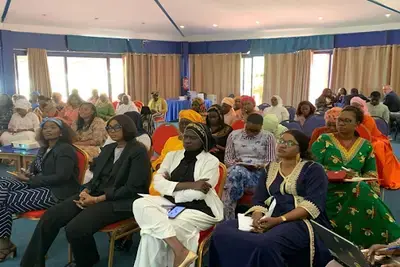
Success Story
Research Shows Somali People Are Eager to Engage in a New Way Forward
Highlighting a shift in Somali opinion over the last year, focus group research released by NDI shows that citizens have lost faith in their transitional institutions and are looking for new opportunities to provide input on how to move their country forward.
The findings, in a report entitled Searching for Peace: Views and Comments from Somalia on the Foundations of a New Government, are based on research conducted in Somalia from February to June 2011. The second in a series of studies, the research examined Somali citizens’ opinions on the legitimacy of the transitional government and the international community’s interventions as well as the conflict with Al Shabaab, a militant Islamist group.
Conducted across Puntland and South Central Somalia, the research provides a rare glimpse into the perceptions and needs of a population cut off from the rest of the world by 20 years of violent conflict. NDI spoke with men and women from every region, age group and socio-economic background both in and out of areas controlled by Al Shabaab, including Mogadishu and lower South Central, such as Bakool, Bay and Gedo.
Perhaps the most surprising result was that participants were largely positive about the opportunity to create a new constitution. A year ago, in the first round of focus group research, the same topic evoked strong negative responses. Andrea Levy, NDI’s focus group expert and author of the report, stressed just how much this has changed. “I think this provides both an opportunity and a warning to leaders in Somalia. The Somali people are desperate to contribute to their country, but could become even more cynical if their voices are not heeded in the constitutional process,” she said.
Respondents also stressed their distrust of interventions by external forces, including foreign fighters, who they say are using Islam in ways inconsistent with the religion’s tenets. “Somali citizens feel buffeted by all of these external and informal forces out of their control,” Levy added. “They do not feel like they have a say in what happens in their own country.”
In August, NDI presented the preliminary results to representatives of the international community as part of activities surrounding the opening of NDI’s new office in Nairobi. Officials from the United States, the European Union, Denmark, Norway, the African Union and a number of international nongovernmental organizations joined in a discussion on how the research could help their institutions serve the needs of the Somali people.
NDI has conducted similar studies in Armenia, Kosovo, Ecuador, Sudan, Tunisia, Zimbabwe and numerous other countries. The Institute has worked in Somalia since 2005, supporting the transitional institutions and, more recently, the regional Puntland government.
Related:
Published October 12, 2011



